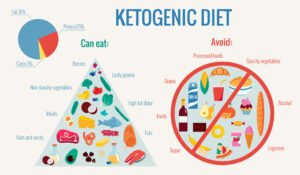Keto Diet For Type 1 Diabetes: Proven, Effective Management
The keto diet for type 1 diabetes has gained attention as a potential game-changer for managing the condition. With the prevalence of type 1 diabetes on the rise, especially among youths and adults in the U.S. and Canada, finding effective management strategies is more crucial than ever.
Recent studies, including one published in 2024 in JCEM Case Reports, highlight the promising benefits of a ketogenic diet in improving glycemic control and reducing insulin requirements for those with type 1 diabetes.
Understanding Type 1 Diabetes
Type 1 diabetes is a chronic condition where the pancreas produces little to no insulin, a hormone essential for allowing glucose (sugar) to enter cells and produce energy.
Unlike type 2 diabetes, which is often related to lifestyle and diet, type 1 diabetes is an autoimmune disease that typically develops in childhood or adolescence, although it can occur in adults as well.

The prevalence of type 1 diabetes is increasing significantly in both the U.S. and Canada. In the U.S., approximately 2.15 per 1,000 youths and 0.5% of adults are diagnosed with this condition. This translates to about 167,000 diagnosed youths.
In Canada, the prevalence among adults varies from 0.22% to 0.89% depending on the estimates. These rising numbers underscore the importance of finding effective management strategies to improve the quality of life for those affected.
Unlike type 2 diabetes, which is often related to lifestyle and diet, type 1 diabetes is an autoimmune disease that typically develops in childhood or adolescence, although it can occur in adults as well.
Managing type 1 diabetes primarily involves regular monitoring of blood sugar levels, administering insulin, and following a balanced diet. However, maintaining normal glycemic levels remains a significant challenge.
Less than 1% of patients achieve normal glycemic control, defined as an HbA1c level below 5.7%. Poor glycemic control can lead to serious complications, including cardiovascular disease, which is 10 times more common in people with type 1 diabetes than in the general population.
Given these challenges, the keto diet for type 1 diabetes offers a promising alternative. This diet emphasizes low carbohydrate intake, which can help stabilize blood sugar levels and reduce the need for insulin.
The following sections will dig into the specifics of the keto diet, its benefits, and practical tips for adopting this dietary approach to manage type 1 diabetes effectively.
Less than 1% of patients achieve normal glycemic control, defined as an HbA1c level below 5.7%.
Poor glycemic control can lead to serious complications, including cardiovascular disease, which is 10 times more common in people with type 1 diabetes than in the general population.

The Keto Diet Explained
The ketogenic diet, commonly known as the keto diet, is a high-fat, low-carbohydrate diet that aims to shift the body’s metabolism from relying on glucose for energy to using fat.
By drastically reducing carbohydrate intake and increasing fat consumption, the body enters a state called ketosis. In ketosis, the liver produces ketones from fat, which then serve as the primary energy source.
A typical keto diet involves consuming about 70-80% of daily calories from fat, 10-20% from protein, and only 5-10% from carbohydrates. This means limiting carbohydrate intake to around 20-50 grams per day. Foods commonly included in a keto diet are meats, fatty fish, eggs, butter, nuts, flax seeds, healthy oils, avocados, and low-carb vegetables like leafy greens.

The keto diet differs significantly from traditional dietary recommendations, which usually emphasize higher carbohydrate intake. Instead of focusing on grains, fruits, and starchy vegetables, the keto diet prioritizes foods that are low in carbs but high in healthy fats. This shift helps stabilize blood sugar levels, which is particularly beneficial for individuals with type 1 diabetes.
The keto diet differs significantly from traditional dietary recommendations, which usually emphasize higher carbohydrate intake.
It prioritizes foods that are low in carbs but high in healthy fats, which helps stabilize blood sugar levels, which is particularly beneficial for individuals with type 1 diabetes.
The keto diet’s ability to maintain stable blood glucose levels can reduce the frequency and severity of blood sugar spikes and drops. This stability is crucial for managing type 1 diabetes, as it can help prevent complications associated with fluctuating glucose levels. Additionally, the diet’s high-fat content can help individuals feel full and satisfied, reducing overall calorie intake and supporting weight management.
By understanding the principles of the keto diet and how it works, individuals with type 1 diabetes can better appreciate its potential benefits. In following sections, we’ll explore these benefits in more detail, providing evidence from recent studies and practical tips for those considering this dietary approach.
Benefits of the Keto Diet for Type 1 Diabetes
Improved Glycemic Control
One of the most significant benefits of the keto diet for type 1 diabetes is improved glycemic control. Maintaining stable blood sugar levels is crucial for individuals with type 1 diabetes, as fluctuations can lead to severe complications. The 2024 study published in JCEM Case Reports highlights this advantage.

Before starting the keto diet, the patient’s HbA1c levels were above the desired target. However, after adopting the diet, their average HbA1c dropped to 5.5% over ten years. The study notes, “the sustained improvement in glycemia and decrease in insulin load-enhanced whole-body insulin sensitivity will likely decrease the risk of adverse microvascular and macrovascular outcomes.”
The keto diet’s ability to maintain stable blood glucose levels can reduce the frequency and severity of blood sugar spikes and drops, helping to prevent complications associated with fluctuating glucose levels.
Additionally, the diet’s high-fat content can help individuals feel full and satisfied, reducing overall calorie intake and supporting weight management.

Reduced Insulin Requirements
Another notable benefit is the significant reduction in insulin requirements. Insulin is essential for people with type 1 diabetes, but managing its dosage can be challenging. The keto diet helps by reducing the body’s dependence on exogenous insulin.
In the study, the patient’s total daily insulin dose decreased by 43%, from 67 IU to 38 IU. This reduction is mainly due to decreased bolus insulin needs, as the patient’s body became more efficient at utilizing insulin. As the study states, “Total insulin load decreased by 43% during ketogenic diet therapy,” illustrating the diet’s effectiveness in lowering insulin dependency.
In the study, the patient’s total daily insulin dose decreased by 43%, from 67 IU to 38 IU.
This reduction is mainly due to decreased bolus insulin needs, as the patient’s body became more efficient at utilizing insulin.

Safety and Health Impacts
The long-term safety and health impacts of the keto diet are also promising. Concerns often arise about potential negative effects on cholesterol levels, thyroid function, kidney function, and bone mineral density. However, the study found no significant adverse effects in these areas.
While the patient’s LDL cholesterol levels increased, the increase was in large, buoyant LDL particles, which do not pose a higher cardiovascular risk.
The study explains, “a detailed analysis of plasma lipids in 2023 revealed the increase in plasma LDL cholesterol was unlikely to have been caused by an increase in small dense LDL, suggesting a plasma lipid pattern that is not associated with a significantly increased risk of cardiovascular disease.”
Managing Hypoglycemia
Managing hypoglycemia is a critical aspect of diabetes care. The keto diet can help by stabilizing blood sugar levels, though some may worry about increased hypoglycemia risk.
The study found that while the patient experienced some time with blood glucose levels below 70 mg/dL, there were no severe hypoglycemic events. The patient’s awareness of low blood sugar levels remained intact, preventing any major issues.
This finding is crucial, as it shows that the keto diet can help manage blood sugar without increasing the risk of severe hypoglycemia.
Practical Tips for Adopting a Keto Diet
Getting Started with a Keto Diet
Starting a keto diet for type 1 diabetes management can seem daunting, but with the right approach, it becomes manageable and beneficial. Begin by reducing carbohydrate intake gradually to ease the transition.
Aim to consume no more than 20-50 grams of carbohydrates per day. Replace high-carb foods with keto-friendly options like meats, fatty fish, eggs, cheese, nuts, flax seeds, and low-carb vegetables such as leafy greens, broccoli, and cauliflower.
It’s important to increase your intake of healthy fats to make up for the reduced carbohydrates. Include foods like avocados, olive oil, coconut oil, and butter in your diet. These fats will help keep you full and provide the energy your body needs while in ketosis.

Maintaining the Diet
Long-term adherence to the keto diet requires planning and consistency. Keep track of your daily carbohydrate intake using apps or food diaries to ensure you stay within the recommended limits.
Regular monitoring of blood sugar levels is crucial to adjust your insulin doses as needed. As the study demonstrated, a significant reduction in insulin requirements is possible, but it’s essential to do this under medical supervision to avoid hypoglycemia.
Meal planning and preparation can also help maintain the diet. Prepare keto-friendly meals and snacks ahead of time to avoid the temptation of high-carb foods. Staying hydrated and replenishing electrolytes, like sodium, potassium, and magnesium, is vital since the keto diet can cause an initial drop in these minerals.
Regular monitoring of blood sugar levels is crucial to adjust your insulin doses as needed. As the study demonstrated, a significant reduction in insulin requirements is possible.
Monitoring Progress and Health
Regular check-ups with your healthcare provider are essential to monitor your overall health and adjust your diet as needed. Continuous glucose monitoring (CGM) can provide real-time feedback on your blood sugar levels, helping you and your healthcare team make informed decisions.

Pay attention to your body’s signals and adjust your diet accordingly. If you experience any adverse effects or find it challenging to adhere to the keto diet, consult with a nutritionist or dietitian specializing in diabetes care. They can provide personalized advice and modifications to suit your needs.

Key Takeaways
- The keto diet for type 1 diabetes offers significant benefits in managing blood sugar levels and reducing insulin requirements.
- The 2024 study published in JCEM Case Reports showed a decrease in HbA1c levels to an average of 5.5% over ten years.
- Insulin requirements were reduced by 43%, highlighting the diet’s effectiveness in improving insulin sensitivity.
- Long-term keto diet adherence did not negatively impact thyroid function, kidney function, or bone mineral density.
- Managing hypoglycemia is crucial, but the study found no severe hypoglycemic events with the keto diet.

Final Thoughts
The keto diet for type 1 diabetes presents a promising approach for better managing the condition. The study discussed underscores its potential to improve glycemic control and reduce insulin dependence without adverse health effects. With the rising prevalence of type 1 diabetes, particularly among youths and adults in the U.S. and Canada, exploring dietary strategies like the keto diet becomes increasingly important.
The 2024 study’s findings encourage individuals with type 1 diabetes to consider the keto diet as a viable option. Improved HbA1c levels, reduced insulin needs, and stable overall health outcomes make a compelling case for this dietary approach.
Starting and maintaining a keto diet requires careful planning and regular monitoring. It’s crucial to work closely with healthcare providers to ensure safe and effective implementation. By taking these steps, individuals with type 1 diabetes can experience the benefits of the keto diet, leading to better health and quality of life.
If you’re considering the keto diet for managing type 1 diabetes, consult your healthcare team to tailor the diet to your specific needs. With proper guidance and adherence, the keto diet can be a powerful tool in your diabetes management plan.
References
- Efficacy and Safety of Long-term Ketogenic Diet Therapy in a Patient With Type 1 Diabetes. JCEM Case Reports
- Managing type 1 diabetes mellitus with a ketogenic diet. Endocrinology, Diabetes & Metabolism Case Reports
- Advanced Cardiovascular Physiology in an Individual with T-1 Diabetes After 10-Year Ketogenic Diet. Cell Physiology
- Can a ketogenic diet be safely used to improve glycaemic control… BMJ Journals
Keto PowerFlax Baking Mix: Keto & So Much More!

- Commercial Bakeries: you can easily produce delicious flax-based keto-friendly products which are clean label, high protein, high fiber and vegan
- Works with your current equipment and baking processes
- Recipes provided on all bulk orders, with ongoing customer support
- Worldwide shipping
- Get in touch with us today!


